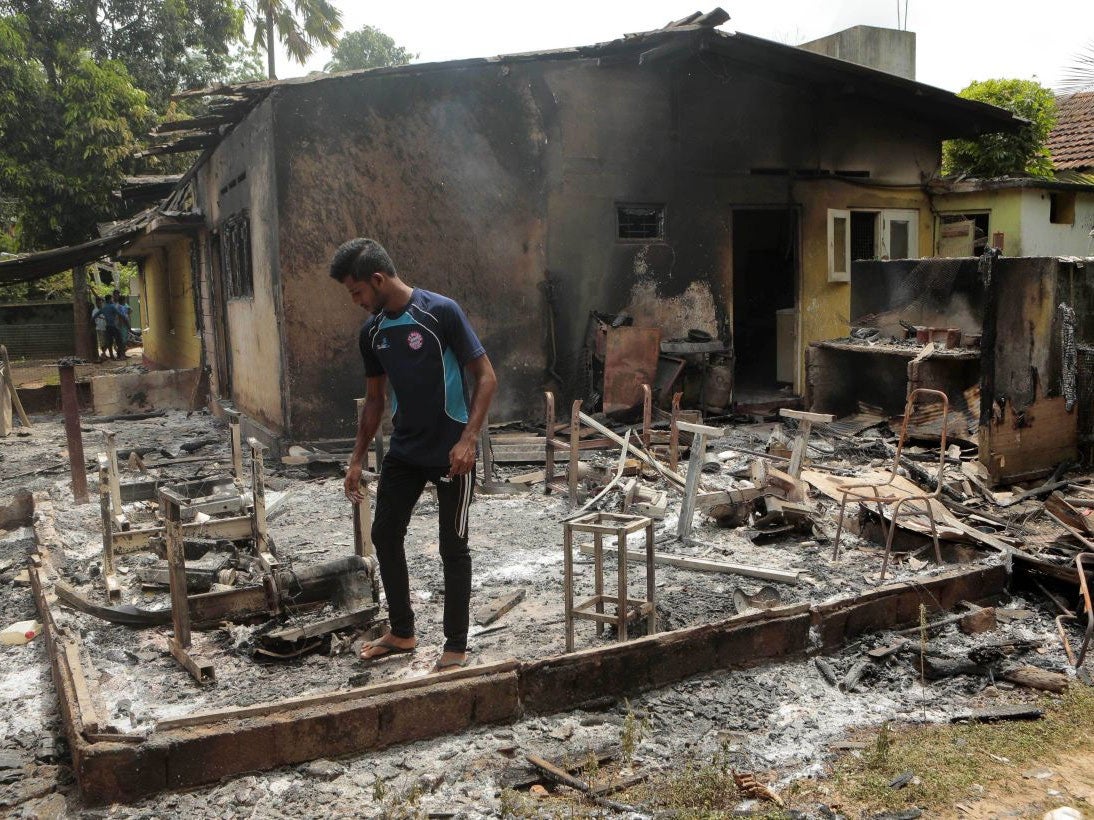Violence in Sri Lanka won't just kill tourism – it will sink the economy
The recent riots in Aluthgama are the last thing the country needs


Sri Lanka has so much going for it. After five years of peace, the vital tourism industry is recovering strongly. The economy grew at 7.6 per cent in the first quarter of 2014, 1.5 per cent better than 2013. A fine new network of (almost empty) motorways link the major towns.
The Jaffna peninsula, mired in war and terror for decades, feels increasingly normal now, and will soon be connected to Colombo by fast and comfortable Chinese-built trains. The government is produced by properly conducted elections. In a world of failed and failing states, this former British colony seems a beacon of hope.
So what exactly happened at Aluthgama last Sunday?
Many of the facts are disputed but there is no doubt that at least three Muslims were killed in this coastal town, and that a mob incited by an extremist group called Bodu Bala Sena, or “Buddhist Power Force”, was involved in the killings. There is equally little doubt that Wataraka Vijitha Thero, a Buddhist monk who condemns the extremists, was on Wednesday stripped of his robes, slashed with knives and beaten unconscious near Colombo.
That Buddhist monks should incite their followers to kill, as is alleged, beggars belief.
A climate of fear has long hung over the Sri Lankan media, but that has not deterred mainstream newspapers from repeating claims that the ruling Rajapaksa clan – and in particular Gotabhaya Rajapaksa, the defence chief behind the extermination of the Tamil Tigers’ chief Velupillai Prabhakaran and his followers in 2009 – was somehow complicit in the violence.
This makes no sense that an outsider can understand.
Why should they play such a role? It is argued that it was a political tactic, a way of polarising the Buddhist vote behind the Rajapaksa clan’s party, the Sri Lanka Freedom Party. But elections are not even scheduled. The government’s majority is overwhelming. They have the peace dividend on their side, as well as the steaming economic successes mentioned above. With such achievements in their pocket, why resort to dirty tactics?
Then there is the location of the violence. While the north, turned upside down for decades by civil strife, is today as placid as a millpond, it was the south-west that went up in flames: the corner of the country into which the foreign tourists pour, the location of fancy hotels and resorts. It was in the heart of this region of palm groves, golden beaches and azure seas that the killings and burnings occurred; and it was here that was flooded with troops and put under curfew.
Tourism is the most sensitive of industries, and the region’s hoteliers are terrified that the coming season will be torpedoed by cancellations. Why put such an important success in jeopardy?
Finally, there is the matter of timing. This week, parliament voted overwhelmingly to refuse entry to the United Nations Human Rights Commission team investigating war crimes allegedly committed by government troops in the final battles of the civil war.
The government has long maintained that the head of the Commission, Navi Pillay, a South African of Indian Tamil origin, is biased against them. It further maintains, with some justification, that the large, vocal and politically sophisticated Tamil diaspora, which did so much to galvanise international opinion on the Tamils’ side during the civil war, is doing the same again now. But if the ruling clan were indeed somehow involved in this week’s violence, perhaps the outside world is right to consider them pariahs.
I believe that the definitive ending of the civil war – even with the dreadful loss of civilian life – was an absolute good, and as a result I have some sympathy with the regime’s stubborn dead bat on this matter.
For many years, Sri Lanka seemed to be teetering on the brink of becoming a failed state. For much of that time the outside world was almost insanely indulgent towards Prabhakaran’s organisation, the Liberation Tigers of Tamil Eelam (LTTE), which in its ruthless fanaticism, not to mention its use of suicide as a weapon of war, was an important precursor of Islamist groups like Isis.
Indeed, the insistence of some western countries on treating the LTTE as morally equivalent to Sri Lanka’s elected government betrayed the same kind of fatal myopia we saw recently in their support for the insurgent groups massing against Bashar al-Assad in Syria.
Thanks to the clumsy attempts of Britain, France and Norway to bear down on the Sri Lankan regime in the civil war’s terrible last phase, we lost whatever leverage we may once have enjoyed over them. The Chinese rushed into that vacuum, and have gained the most from the development opportunities that flowed from the war’s end.
The Chinese are proud of their tradition of allowing their clients to behave exactly as they please, in contrast to the moralising west. But they are astute enough to know when those clients are courting unnecessary trouble. If the south-west were to explode again, the economic consequences would be severe.
In the current low season, it is thousands of Chinese visitors – until recently a rare sight here – who are keeping the hotels’ lights on. If the Rajapaksa government really is involved in instigating fear and loathing between the communities of the south, the Chinese should find a way of pointing out that their citizens are unlikely to keep on coming if the resort towns again go up in flames.
Join our commenting forum
Join thought-provoking conversations, follow other Independent readers and see their replies
Comments
Bookmark popover
Removed from bookmarks